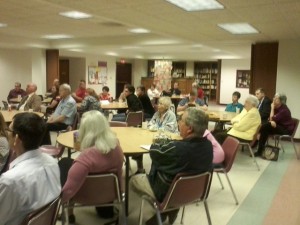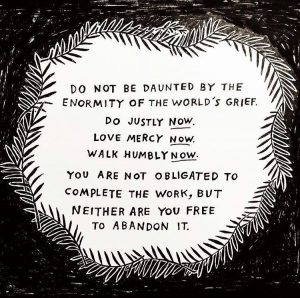 In the beginning, God said . . . and there is creation.[1] In the beginning was the Word, and the Word became flesh . . . and there is salvation.[2] When we cry “Abba! Father!” it is not us but the Spirit who speaks through us . . . and there is sanctification.[3] At the core of our faith is communication and personal relationship, and how we express that is vitally important. It is more than an intellectual enterprise. Choosing, using, hearing, reading, interpreting, and translating our words and those of scripture is a spiritual and existential exercise, as well. To demonstrate this, I have brought a prop to use this morning: this. [Bottle of Mountain Dew]
In the beginning, God said . . . and there is creation.[1] In the beginning was the Word, and the Word became flesh . . . and there is salvation.[2] When we cry “Abba! Father!” it is not us but the Spirit who speaks through us . . . and there is sanctification.[3] At the core of our faith is communication and personal relationship, and how we express that is vitally important. It is more than an intellectual enterprise. Choosing, using, hearing, reading, interpreting, and translating our words and those of scripture is a spiritual and existential exercise, as well. To demonstrate this, I have brought a prop to use this morning: this. [Bottle of Mountain Dew]
What is this? I mean, generically what is this beverage called? You might call it “pop” or “soda” or (despite the fact that it is not a cola and not a product of the Coca-Cola Company) if you were from some parts of the American South you might call it a “coke.” If you were from Great Britain or Ireland, you might call it a “fizzy drink.” If a man we have just met describes Mountain Dew as his favorite kind of Coke or calls it his favorite fizzy drink, we will automatically know something about him and we will assume much, much more, and what we know, what we think we know, and what we assume will all color our relationship with our new acquaintance.
 When I was a kid growing up first in southern Nevada and then in southern California, the weeks leading up to Christmas (we weren’t church members so we didn’t call them “Advent”) were always the same. They followed a pattern set by my mother. We bought a tree and decorated it; we set up a model electric train around it. We bought and wrapped packages and put them under the tree, making tunnels for that toy train. We went to the Christmas light shows in nearby parks and drove through the neighborhoods that went all out for cooperative, or sometimes competitive, outdoor displays. My mother would make several batches of bourbon balls (those confections made of crushed vanilla wafers and booze) and give them to friends and co-workers. Christmas Eve we would watch one or more Christmas movies on TV, and early Christmas morning we would open our packages . . . carefully so that my mother could save the wrapping paper. Then all day would be spent cooking and watching TV and playing bridge. After the big Christmas dinner, my step-father and I would do the clean up, my brother and my uncle would watch TV . . . and my mother would sneak off to her room and cry. You see . . . no matter how carefully we prepared, no matter how strictly we adhered to Mom’s pattern, something always went wrong. We never got it right; Christmas never turned out the way my mother wanted it to be.
When I was a kid growing up first in southern Nevada and then in southern California, the weeks leading up to Christmas (we weren’t church members so we didn’t call them “Advent”) were always the same. They followed a pattern set by my mother. We bought a tree and decorated it; we set up a model electric train around it. We bought and wrapped packages and put them under the tree, making tunnels for that toy train. We went to the Christmas light shows in nearby parks and drove through the neighborhoods that went all out for cooperative, or sometimes competitive, outdoor displays. My mother would make several batches of bourbon balls (those confections made of crushed vanilla wafers and booze) and give them to friends and co-workers. Christmas Eve we would watch one or more Christmas movies on TV, and early Christmas morning we would open our packages . . . carefully so that my mother could save the wrapping paper. Then all day would be spent cooking and watching TV and playing bridge. After the big Christmas dinner, my step-father and I would do the clean up, my brother and my uncle would watch TV . . . and my mother would sneak off to her room and cry. You see . . . no matter how carefully we prepared, no matter how strictly we adhered to Mom’s pattern, something always went wrong. We never got it right; Christmas never turned out the way my mother wanted it to be. While making a presentation at a conference about teaching English as a second language, an expert in the field remarked that one of the difficulties is that there are many instances in English when a double-negative renders positive meaning and this is confusing for non-English speakers. “It’s fortunate,” she said, “there’s no way in English that a double positive can convey negative meaning.”
While making a presentation at a conference about teaching English as a second language, an expert in the field remarked that one of the difficulties is that there are many instances in English when a double-negative renders positive meaning and this is confusing for non-English speakers. “It’s fortunate,” she said, “there’s no way in English that a double positive can convey negative meaning.”  This is a special Sunday for me. Friday marked the 28th anniversary of my ordination as a priest in the Episcopal Church. It was on Sunday, June 23, 1991, that I celebrated my first mass. So I am grateful to you and to Fr. George for the privilege of an altar at which to celebrate the Holy Mysteries and a pulpit from which to preach the gospel on this, my anniversary Sunday.
This is a special Sunday for me. Friday marked the 28th anniversary of my ordination as a priest in the Episcopal Church. It was on Sunday, June 23, 1991, that I celebrated my first mass. So I am grateful to you and to Fr. George for the privilege of an altar at which to celebrate the Holy Mysteries and a pulpit from which to preach the gospel on this, my anniversary Sunday.
 Lenten Journal, Day 34
Lenten Journal, Day 34 Lenten Journal, Day 26
Lenten Journal, Day 26 Lenten Journal, Day 24
Lenten Journal, Day 24 I’m not preaching this week, but if I were . . .
I’m not preaching this week, but if I were . . . Lenten Journal, Day 21
Lenten Journal, Day 21

